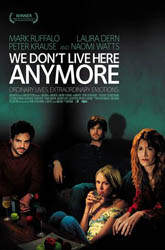 Director:
John Curran
Starring:
Mark Ruffalo
Laura Dern
Naomi Watts
Peter Krause
Release: 13 Aug. 04
IMDb
|
We Don't Live Here Anymore 
BY: DAVID PERRY
Based on two short stories by Andre Dubus, We Donít Live Here
Anymore isnít quite the wife-swapping movie that it may seem at first. John
Curran effectively introduces his characters with marriage seemingly a side
note. The four-person dinner party has pairings, but their marital bonds
donít seem fully comprehensible until two begin talking about an affair
together.
Though these characters are married, their relationships are all tortured.
They seem willing to destroy each other because they cannot fully grasp
their own emotions, and the unpleasant fact that someone is destined to be
hurt hangs ominously over the drama. By the end theyíve all been
hurt -- the power of the performances is in the different ways they react to
their spousesí and friendsí affairs.
These are gut-wrenching portrayals presented with a unsympathetic gaze
reserved for directors willing to allow some audience members to be
flummoxed by the uncomfortable silences and deafening screams. The children
caught between -- completely unaware of why their parents are fighting --
are integral to the story because they serve in many ways as proxies for the
audience. Their curiosity into whatís going on in their parents lives is
punished by seeing the raw emotions that they project. That Curran tensely
presents the idea that two of the children might be killed at one moment,
the tenuousness of this vantage point becomes clear.
Even when the filmís manic-depressive housewife, Terry (Dern), goes into
hysterics from the affair she can sense seething from every orifice in her
husband Jack (Ruffalo), the annoying outburst is no less commendable than
the near catatonia from Hank (Krause; not only the best actor in Sex Feet
Under, but now the best actor in this performance-strong film) upon learning
himself a cuckold by his wife Edith (Watts). For much of the film, these
reactions have been waiting to arrive, the quickies by Jack and Edith long
seeming impossible to keep secret, and their formulation is compounded by
the audienceís own divisions. All these characters seem like people in our
lives, and making a complete judgment on a few of them feels false because
thereís a hint of need for instant forgiveness regardless of the crime. Like
that uncomfortable meeting with the recently reunited couple, the knowledge
of their stories together makes this film unpleasant to watch, however
necessary the absolution is.
 |

